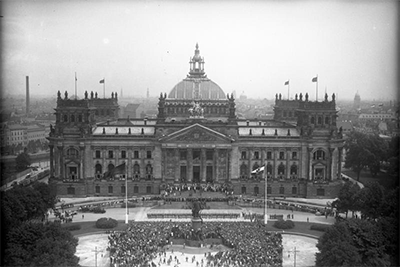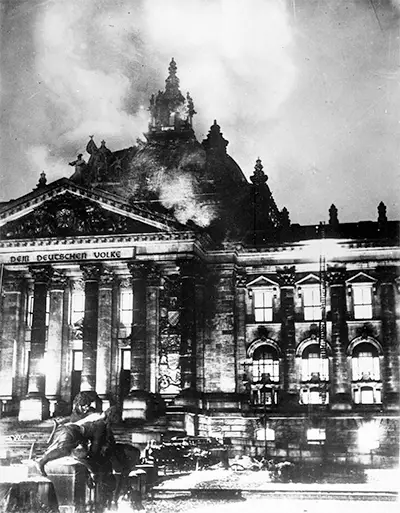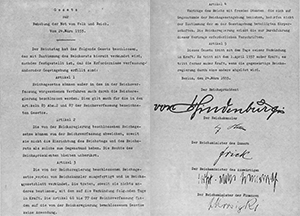The Enabling Act of 1933
The Enabling Act consolidated the power of the German government in the hands of its Chancellor, Adolf Hitler, in 1933. 
Germany at the time was still the Weimar Republic, a representative government run by multiple branches that depended on one another to pass and promulgate laws. The members of the chief legislative body, the Reichstag, were elected by the people at large; the various German states appointed the members of the other legislative body, the Reichsrat. The latter acted in an advisory capacity; the former was the body tasked with passing laws, whether they proposed them or whether they were acting on proposals from the President. Supporting all of this was the Weimar Constitution. In the daily doings of government, the President filled the role of a chief executive, making treaties and alliances and serving as commander-in-chief of the armed forces. The President also had the power to submit any Reichstag-enacted law to a public referendum and even to dissolve the Reichstag. The President could also assume the mantle of total authority if a state of emergency existed. 
It was that last power that President Paul von Hindenburg exercised in the issuing of the Fire Decree, in the wake of the Reichstag fire. Among other things, the Fire Decree suspended civil liberties throughout the country. The Nazi Party had garnered the most votes in the last election and, therefore, had the highest number of seats in the Reichstag; however, that party did not have enough seats to form a majority on its own. Finding no other political parties willing to form a coalition, the Nazi Party resorted to being a stumbling block for legislation. In desperation, Chancellor Franz von Papen called for yet another election, to take place on March 5, 1933. The Reichstag burned on February 27. Hindenburg had named Adolf Hitler as Chancellor in January. After the fire, he named members of the Communist Party as perpetrators of the fire and suspended their privileges, including their membership in the Reichstag. Thus, they did not take part in the new elections and so were effectively bypassed in subsequent legislative initiatives. In the March elections, the Nazi Party still did not gain a majority of seats in the Reichstag. Hitler and other party leaders resolved to find a way without having to have such a majority. The result was the Enabling Act. The full title was the Law to Remedy the Distress of People and Reich. In effect, the law allowed the Chancellor to assume total power. The law allowed the Chancellor and his advisors to create laws, without having them approved first by the Reichstag. This was a clear departure from the existing departure and so required the approval of two-thirds of the Reichstag. With the Communists out of the way, the only political party definitely expected to oppose the Enabling Act was the Social Democrats (SPD). The Centre Party was on the fence, and so Hitler promised the party chairman a host of protections for the Catholic Church, the force behind the party; in the end, the Centre Party members voted for the Enabling Act, as did members of every other political party.  With the necessary two-thirds, the Enabling Act became law; thus, the Reichstag gave up its own power. Among the provisions of the Act were these:
With the necessary two-thirds, the Enabling Act became law; thus, the Reichstag gave up its own power. Among the provisions of the Act were these:
Technically, the Enabling Act had merely added the Chancellor as a possible source of laws. However, the fact that the Reichstag wasn't needed to approve those laws definitely relegated the legislature to bystander status. The last part of the Enabling Act stated that the act itself would wink out of existence four years after its installation unless an extension was approved. Such extensions were approved in 1937 and again in 1941; by the time of the first extension, the Nazi Party was the only political party to which Germans could lawfully belong. |
|
Social Studies for Kids
copyright 2002–2026
David White




